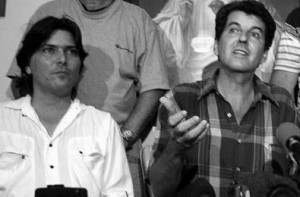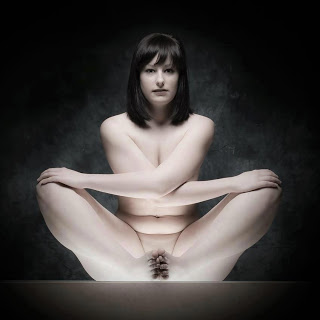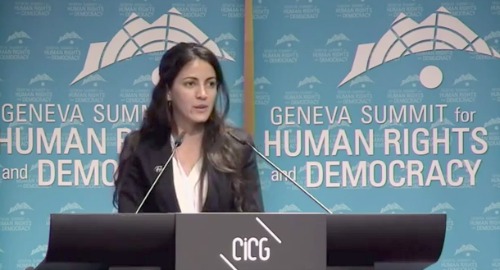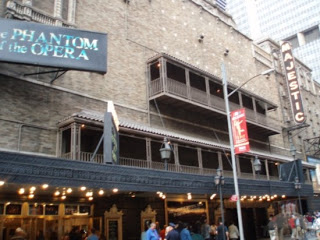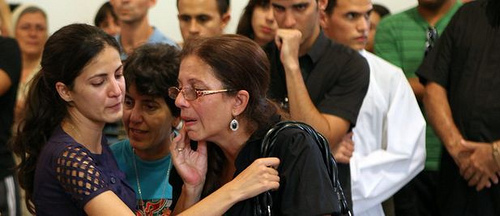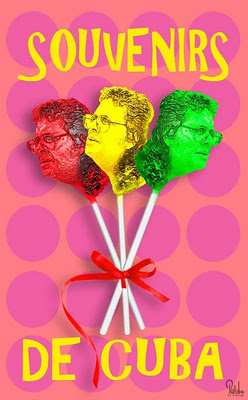At 9 am I called tía Beba’s house. I was waiting to hear Efrén answer the phone as usual and update me on the early news of that March 19th day, as we did every day. The day before I had called in the morning and asked him to ask Oswaldo if my presence was necessary in the neighborhood of el Cerro. I wanted to dedicate the afternoon to getting together with the Citizen Committee of the 10 de Octubre district, and check on the march for the signature collection campaign in support for the Varela Project demand. After checking in with Oswaldo, he gave me the green light.
I spent March 18th along with fellow activists until late in the afternoon. Later on, as usual, I visited my friends in the neighborhood and ended the night well after midnight with my dearest friends Luis Torres and Alejandro Rivero. Back home my worried mother waited for me, as news went around of the arrest of a group of activists and independent journalists who were gathered in James Cason’s home, the Principal Officer to the U.S Interest Section in Havana.
So that she wouldn’t worry, I didn’t give it much importance. I told her that as usual, they would let them go after a couple of hours, and that in any case, some of Cason’s guests were notorious informants for the regime’s political police. What was happening had nothing to do with us.
I hadn’t had the chance to look at the official reports because I had been busy at work as manager of the Citizen Committees. Besides, the circles I was frequenting weren’t too fond of listening to the “round tables” or the regime’s news. Therefore, that March 18th I had been unaware of the storm that battered against the peaceful Cuban opposition. In any case, the disinformation of the official television did not give bigger clues as to what was really happening.
I went to sleep and my mother felt more tranquil.
The next day, on March 19th, it wasn’t Efrén who answered the phone. I was surprised as I heard Ernesto Martini, “Freddy”, pick up the phone and say: “Come here immediately, last night they detained Efrén, several managers for the Varela Project al over the country, and other members of the opposition”. I couldn’t yet understand what was happening when I hung up the phone and left immediately on my bike on my way to el Cerro.
Oswaldo was already with Tony Díaz in the streets, visiting the families of those who had been detained; the list grew longer every hour. They also went to visit members of the diplomatic body in Havana that was responsible for denouncing what was happening, without a doubt a repressive wave whose outcome was still unknown.
I started answering phone calls from members of the press who were interested in knowing what was occurring. At the same time, new information was constantly reaching us about arrests throughout the country. The numbers reached dozens by that second day of the repressive surge.
That night Oswaldo came back along with Tony; they were exhausted. Tony went back home to Marianao to clean up and eat something. To distract the kids a bit, we had promised to take them to the Cerro stadium to watch a baseball game starring the Industriales team. However, as we were eating dinner before going out with Oswaldito and Rei, Rosa María picked up a call that seemed urgent. “Hold on, I’ll put Regis on the phone,” said Rosa Maria to the speaker while she gave me a worried look. It was Yeni, Tony’s older daughter. Crying, she was telling me that they were arresting her father. I cheered her up and tried not to worry her even more.
We didn’t go to the baseball game. Oswaldo and I went to tía Beba’s house, a block away from his, and took over Freddy’s post as we answered calls from family members and journalists. Already the political police’s siege had reached our neighborhood. We could see dozens of people on foot and in automobiles going around our block and passing in front of Beba’s house. Then came a Spanish correspondent to interview Oswaldo, and he was with us for a long while waiting for our own arrests. Years later this journalist proved to be an agitator who for some reason only he can clarify, has been determined to openly attack peaceful Cuban dissidents and to defend the hangmen and hit men of the regime.
Freddy had already left and only Oswaldo and I remained to face the imminent assault on his aunt’s house, where our office functioned. Late in the night, when everything seemed more calm, we agreed that I would stay the night at Beba’s house, since thousands of new signatures in support of the Valera Project were still there.
The next morning, on March 20th, Freddy arrived. Oswaldo and I went to Ricardo Montes’s house, another leader of our Movement. The persecution we faced was fierce; we had wanted to move around in Ricardo’s old motorcycle, but seeing how aggressive our persecutors were, we decided not to take the risk and to continue onto Tony’s house on a bus.
The State Security cars were ostentatiously visible. One of them, which we had been following with our eyes since we took the bus on 51st Ave, moved ahead, and when we reached the next stop an agent came down from the car and got on the public vehicle in which we were traveling. He came as close as three feet from us inside the bus.
When we stepped down, he got off with us, and continued to walk a couple of yards behind us until he disappeared into a car. At that moment, we were being followed by a white van, an ambulance, two Ladas and even a Mercedes Benz. Only the helicopter was missing, perhaps for lack of fuel, in an effort to corner two simple and peaceful mortals like us.
We arrived at Díaz’ house, and found his whole family there, worried: his wife Gisela, his daughter Yeni, his mother-in-law and his brother. They told us about the violent unfolding of the intimidation efforts against his wife and his younger daughters the night of Tony’s arrest.
We immediately moved to the Dutch embassy. The ambassador guaranteed that her country would denounce the oppressive wave, and would ask the Cuban regime to explain itself. The same occurred in the Spanish embassy, where Oswaldo was able to speak to President Aznar and with Pat Cox, then president of the European Parliament.
We moved on and passed by a Church where many friends were assembled. We were able to see images on CNN in which they interviewed independent journalist Omar Rodríguez Saludes. From the balcony of his apartment, the cameras focused on the deployment of agents waiting for orders to detain him. We read an interview that I had given Miami’s New Herald the day before, denouncing the cowardly provocations from the regime. At the same time, we crafted an emergency plan for such a dramatic moment.
We were exhausted but could not stop; our pursuers could stop if they wanted. As we stopped briefly to drink something, Oswaldo tells me: “We’ll gather every member of the movement in front of Villa Marista until they release every single detainee.”
I replied, “Don’t you realize this is purposely directed against us? The great majority of those arrested are managers of the Valera Project. They have detained our leaders in the entire country, and only you and I remain. No; whoever remains must organize our people again and continue. Those of us who fall must wait for better times, now there’s nothing we can do. We have a minimal base but it’s not enough to challenge the government on this terrain. If we act with a hot head we’ll destroy everything we have accomplished. It already feels strange that I haven’t been arrested yet.”
He looked at me; I noticed his anguish. Oswaldo was suffering for every single one of our detained brothers, and for their families. He wanted to be there himself, behind the walled-in doors of Villa Marista, the general headquarters of the Cuban political police. I felt his suffering; I was able to see that man’s greatness through the pain in his eyes, while at the same time they shined with the same determination as always to continue, despite everything, fighting for the rights of all Cubans.
We went on until reaching the parish church Cristo Rey. We stepped inside the temple. A priest who was our friend came to us worried with what was happening according to the news; he offered to take me home in his car. I thanked him but declined his kind gesture; I had to continue along with Oswaldo. We knelt down for a couple of minutes and prayed for our detained brothers, for their families, for the leaders and activists of the MCL and the Cuban opposition, for the thousands of citizen signatories of the Valera Project and for all Cubans. The sinister cloud that has reigned over our dear homeland for so many decades is today even more dangerous and menacing.
We went back to Beba’s house, with the hope that everything had stopped and that we would hear back from the first freed dissidents in a few hours. Freddy presented the hard reality, more people had been arrested, and there was no sign that what was happening was something, as in other times, temporary.
We then put ourselves to the task of contacting those who were still in liberty, communicating to them that the work for the rights of Cubans would continue under any circumstance.
Around 8 pm I told Oswaldo I would go to my parents’ house for a few hours and that I would come back as soon as I was done cleaning up and eating something. He insisted that I should stay. “Don’t go, these people are being very aggressive and they could arrest you too. Ofe (his wife, Ofelia) can make you something to eat and you can shower here.”
“No”, I said, “if they’re going to arrest me they should do it already. I have the feeling they haven’t done it because we have been together all day, but we can’t avoid it forever. Besides, I don’t want them to arrest me while I’m with you. I know you and you’re going to try to stop it, putting yourself at risk. I won’t allow it! You save the Movement, save the Valera Project, and take care of my daughters….Go home with the kids and Freddy and I will go to Lawton for a while and come back.”
He looked at me like a father who could no longer avoid the decisions of a grown son. If he could, he would have tied me down to a chair so I wouldn’t leave. If he could he would have hugged me and wouldn’t have let me go alone to meet our persecutors. All of this he said without speaking, only with his eyes.
“I’ll see you later Bapu”, I said to him, and turned around to speak to Freddy about some trivial topic, waiting for Oswaldo to walk away. I felt him as he left, and it was then that I turned around to look at him as he walked into the darkness of the night towards his house, where Ofelita and the kids waited, worried, for him to come back.
He walked with a firm pace and in his characteristic style. His fists were closed, as with the fury of not being able to stop the unstoppable, as if everything depended on him to bring liberty to Cubans, as if he wanted for himself everything that would befall on us. As if he knew that the road did not end there, and that it would fall on him and on the youngest of his disciples to confront together, alone and years later, the cross of martyrdom.
That was the last time we saw each other, and I’ll never be able to forget his silhouette of light disappearing among the shadows.
Minutes later from my mobile phone I would send him a call, but I wasn’t speaking. As soon as I was able to perceive the maneuver of our detention, I was able to make the call and to throw the phone under the taxicab in which we traveled, amid the struggle with my captors, to stop them from getting it and to give Oswaldo’s family time to find out we had been arrested.
Ofelita, I found out later, was the person who answered the phone and desperately gave it to Oswaldo, as he heard how we were kidnapped right in public. I know that he, our dear Bapu, while admonishing the hit-men who finally picked up the phone with a bit of effort under the car, let run through his tense cheek, a limpid crystal of good-bye.
See you soon, Oswaldo, I know we’ll find each other again, Bapu.
Original post in Spanish is here.
Translator’s note: Regis Iglesia was sentenced along with the other political prisoners of the 2003 Black Spring, in his case to 18 years. He was released in 2010 in a deal brokered by the Catholic Church and sent into exile in Spain.
Translated by: Claudia D.
23 March 2013
